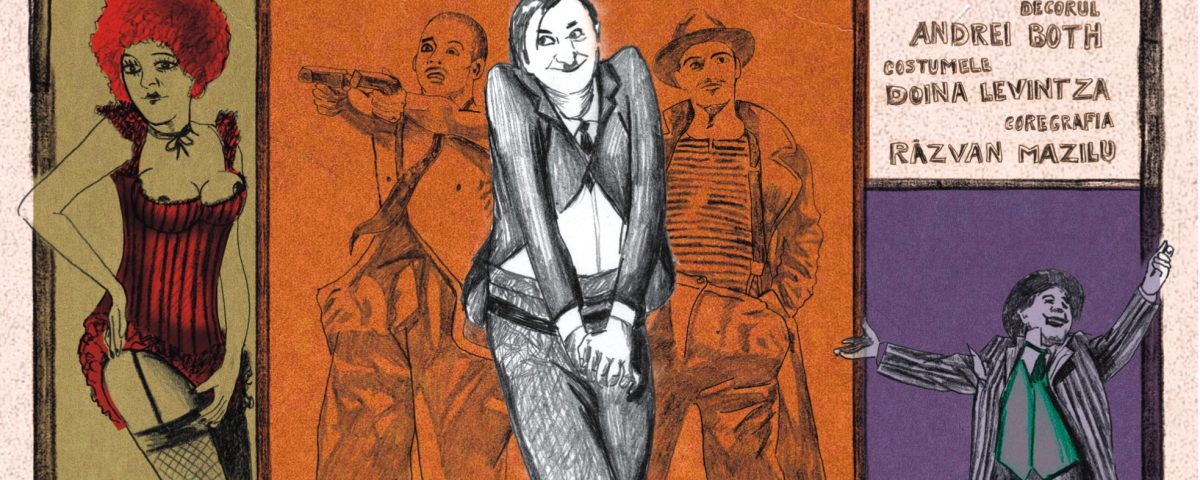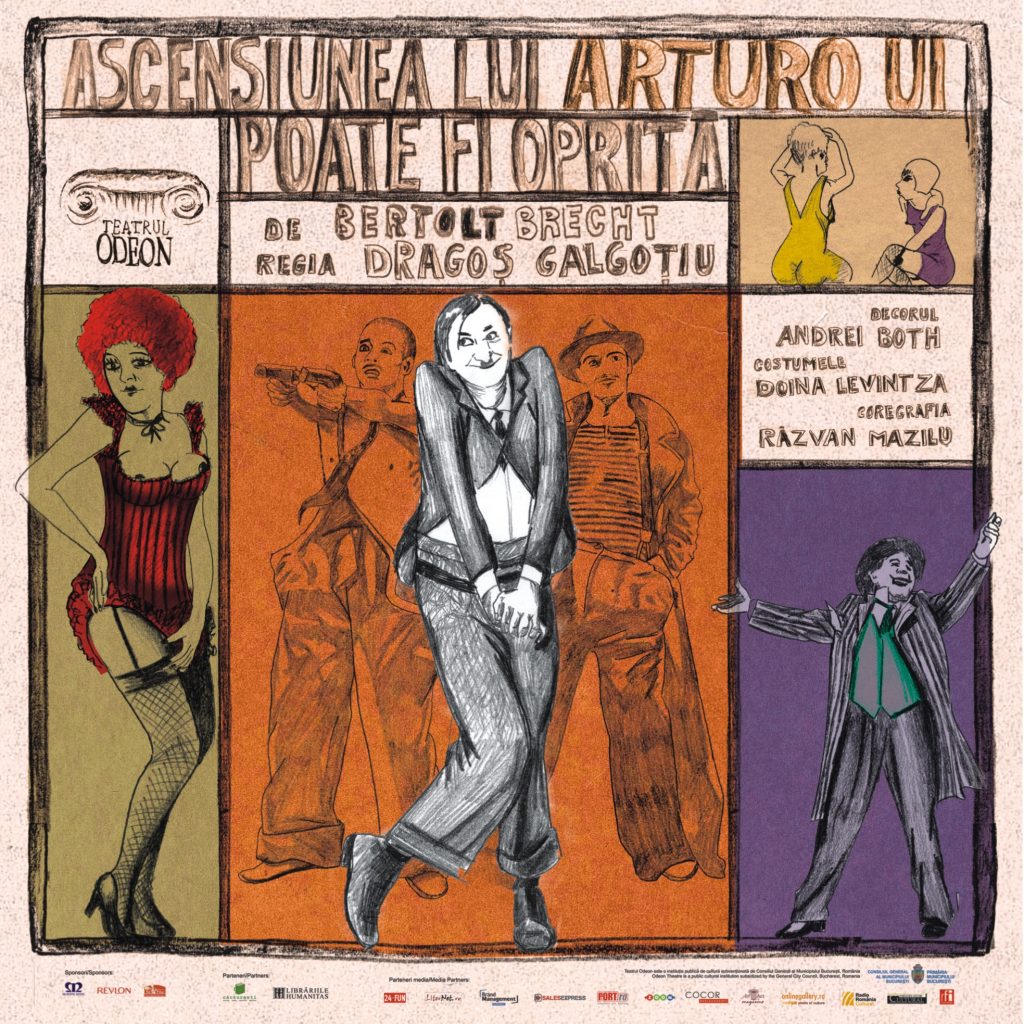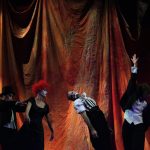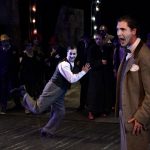By Bertolt Brecht, Directed By Dragoș Galgoțiu
Arturo UI: Ionel Mihăilescu
Dogsborough: Dorina Lazăr
Bertolt Brecht: Vitalie Bantaş
Flake: Mircea Constantinescu
Butcher: Mugur Arvunescu
The Actor: Marian Ghenea
Sheet: Laurenţiu Lazăr
Giuseppe Givola: Gabriel Pintilei
Emanuele Giri: Mihai Smarandache
Ernesto Roma: Istvan Teglas
Betty Dullfeet: Cătălina Mustaţă
Dullfeet: Mircea N. Creţu
Daisy: Ioana Anastasia Anton
The Tailor: Marian Lepădatu
The youngman from Cicero: Ionuţ Kivu
The young woman from Cicero: Ana Maria Moldovan
Cabaret dancer: Ioana Marchidan
Cabaret dancer: Judith State
Directed by: Dragoş Galgoţiu
Set design: Andrei Both
Costumes: Doina Levintza
Choreography: Răzvan Mazilu
Choreography assistant: Ioana Marchidan
Translated by: Mihaela Crețu
Sofia tour, Bulgary, 26 March 2014
Short Theatre Festival in Oradea, 24 September 2013
European Theatre Workshop in Ruse, Bulgaria, 25 June 2013
The Resistible Rise of Arturo Ui, a satirical parable about the rise of Hitler, was written in 1941, in Helsinki, Finland, where Brecht awaiting a visa to enter the United States. It takes place in the gangster world of Chicago, all the characters in the play having direct counterparts in real Nazi Germany. Arturo Ui represents Hitler, Ernesto Roma is Ernst Röhm, Giussepe Givola looks like Joseph Goebbels, Emanuele Giri represents Hermann Göring and Dogsborough reminds us of Paul von Hindenburg.
The play was first produced in 1958, at Berliner Ensemble with great success. On the same stage in 1995 Heiner Müller directed a new version which is still in the repertory of the prestigious company in Berlin.
In 1963 the play was put on stage at Giulesti Theatre, under the direction of Horea Popescu, the stage design of Jules Perahim, with Ştefan Mihăilescu-Brăila as main character. The same year another great actor, Ştefan Iordache was making his debut in Arturo Ui on the stage of Casandra Studio. The Odeon Theatre production is a black comedy with cabaret elements. In a time when politics stifle through aggression, the theatrical staging responds with irony, showing that the monsters of political world are not only terrible, but also extremely ridiculous.
The staging continues radical aesthetic experiences, The Picture of Dorian Gray, Hamletmachine, Epic of Ghilgamesh and Life is a Dream, made by Dragoş Galgoţiu in collaboration with set designer Andrei Both, costume designer Doina Levintza, choreographer Răzvan Mazilu and important actors of Odeon Theatre.
Photos by Mihaela Marin
Press releases
The Resistible Rise of Arturo UI is not only a fascinating theater show, one of the most special artistic experiments in Bucharest this season, but it is also a exciting point of view on the social and anthropological role of the theater in the daily life.
As for the protagonist, the show is an indisputable moment of glory for Ionel Mihailescu. A real catalyst, the actor proves to have untapped by now resources as a strong artistic personality, he succeeds a major part, a tour de force that is the result of a rigorous study.
Răzvana Niţă – port.ro, January 21st, 2013
The Resistible Rise of Arturo UI relies on an expansive flamboyant almost baroque style. And more than anything, I appreciated in the staging of Galgoţiu that he does not use this political play to slip “lizards” in reference to the situation in the contemporary Romanian society. Taking all in all, Galgoţiu respects what the Brechtian theater implies in essence: not to provide the viewer an opportunity to identify with what is unfolding before him, but to present the viewer a situation on which he can reflect.
Silvia Dumitrache – Observator Cultural, January 18th, 2013
Last night at the Odeon Theatre, I saw The Resistible Rise of Arturo UI cannot be stopped by Bertolt Brecht.
All actors proved that they are artists.
How could you assist unaware to such a discharge of energy?
Evil was “spat” between his teeth with a smile, with a ripple of laughter, with voluptuous dance moves, by the sharp lines of the costumes and by the sound of the cabaret.
I felt in turn envy, sorrow, joy and pride.
The envy of not being a man so I could play Ui, the sadness of not being on stage and not being one of them, the joy that I am alive and I can admire such a moment made by others and proud to be an actress and that I am still a child.
Iarina Demian – adevarulonline.ro, January 20th, 2013
The troupe of actors from Odeon has charm and a highly personal presence in this show. With all the years passed over some of the actors, with all the successes and failures and all the more or less happy experiences that they went through, the actors and the director of this show create something very hard to put into words. There are moments when the tension becomes so vivid that you feel you are in a totally different time. Something happens, something rare and magic. As for Ionel Mihailescu, the interpreter of Arturo Ui, I will say nothing – due to the feeling of respect for the exceptional performance that he gives, due to the joy of contemplating the sublime transiency of this success. This is something that needs to be seen.
Cătălin Ștefănescu – Dilema veche, January 31st, 2013
The daring choice of the director Dragos Galgoţiu to instill the show from Odeon with a mixture of frivolous spirit specific for the 20s German cabaret and playful naivety specific for the productions of the golden age of Hollywood seems all too appropriate. The choreography of Razvan Mazilu is adequately inserted in the general concept of the show: the rendering of the whole historical context and of the transition from unconsciousness to terror, from benign hooliganism to heavyweight crimes by means of the cabaret dance can count, I think, as one of the most successful elements of the show. The sensation that is created is that of a vortex of history in which people are sucked in before understanding that they must fight it while the cabaret uproar prevents those who still understand this from being heard. It seems like the only force that has power is the one of evil that is relentlessly pursuing his ultimate goal. Unlike the characters, the audience understands what is happening because they are openly shown the squalid side of things through the intervention of the author’s epic voice, through the playful excesses of the acting and, for the show from Odeon, through the counter-effect of the cabaret dance. Thus, not only is the viewer constantly alerted but also he is equally compelled to take distance from the story played out on stage, compelled not to let himself be dominated by its internal logic, to avoid becoming the prisoner of excessive emotion so that he can keep intact his critical thinking .
Alina Pavelescu – LaPunkt.ro, January 27th, 2013
I think that Dragoş Galgoţiu decided to direct this text under the pressure of the recent events in the history of Romania, with the belief that theater does not need to do politics, but it has the right and the obligation to comment and interpret what is happening in the world of politics; that the conjunctions between theatre and time are over and over again a reality and that they can be re-confirmed not necessarily on very contemporary texts but on texts that, if well directed, have the power to speak to the contemporary age, although it has been a while since they were written.
I am absolutely convinced that the main argument for the stage director was the presence of the extraordinary actor Ionel Mihăilescu in the group. Because before anything The Resistible Rise of Arturo UI is, as it should be, the show of the actor cast in the lead role.
Mircea Morariu – adevarulonline.ro, January 18th, 2013
The bright framework specific for the variety show, the curtains that open one after another, the prologue of the dancers, but especially the distribution of the sketches follow the recipe for the cabaret genre, while the characters take the image of familiar faces, especially those of the painters and the engravers of the time, like Grosz, Kirchner or Kokoschka, for instance, that in the history of the grotesque give us the key to interpreting the world.
The entire ensemble of actors is harmonious, playing with verve and genuine pleasure in Galgoţiu’s cabaret about Arturo Ui, alias the dictator, alias Hitler, alias…
Doina Papp – Revista 22, February 5th, 2013











